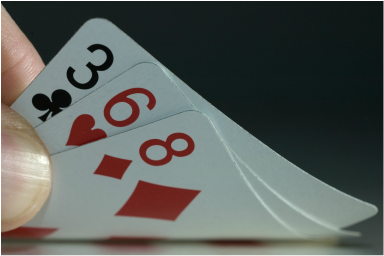|
After living in the Bay Area for most of my life, I’ve gotten used to being in my car a lot, traveling miles and miles to get to friends, to work, to the city. My favorite thing to do to pass the time is listen to podcasts, and recently I’ve been diving deep into the Radiolab archives. Described as “a show about curiosity,” Radiolab touches on an enormous range of topics from cicadas to thorny legal issues to Korean pop music. The last episode I listened to, “Are You Sure?” discusses moments of doubt. In one segment, hosts Robert and Jad talk to Annie Duke, a champion professional poker player, about how she handles the essential uncertainty of the game.
Counter to what most of us assume about being a great poker player, it has less to do with reading people, and more to do with understanding the odds of getting a given card and calculating your risk based on how much money you have, how much is in the pot, and how much you’re betting. The bottom line is that sometimes it makes sense to go for a bet that you’re only 25% sure will turn out well. And the reason for this is the long game. As Duke puts it, “It’s not about winning the hand all the time. It’s about winning the hand enough of the time. If you’re in a situation where you only have to have the best hand 25% of the time, if you’re playing well you’re going to have a bad hand a lot of the time.” Duke goes on to share how embracing this uncertainty helped her let go of the shame and embarrassment she felt when she lost a hand. In the context of the long game, losing was irrelevant. This philosophy really resonated with me, and it’s something I wish high school students had more awareness of. A lot of students and parents assume that perfection is a requirement for success in the college application process, and each moment of loss feels like the end of their college admissions chances. But if you think of high school like a game of poker, you don’t have to be perfect. It’s okay if you run for vice president of the French Club and lose, or if you start a Science Fiction appreciation society and only two people join, or if you’re just a benchwarmer on the soccer team. It’s okay if you have to apply for 8 summer jobs before someone calls you to interview, or if you have to talk to a dozen different businesses before you sell your first ad for the yearbook. The value is not in winning the game, but in simply playing it. Students who take risks, who try new things, and who aren’t afraid to fail sometimes are exactly the kinds of students colleges are looking for. And it’s okay if you don’t get accepted to every college you apply to; if you’ve built a thoughtful list of schools, you’ll have someplace wonderful to go, where you can continue to put yourself out there, where sometimes you’ll lose, but sometimes you’ll win.
0 Comments
Leave a Reply. |
What is the When I Was 17 Project?When I Was 17 is a blog series dedicated to collecting the varied stories of people's career paths, what they envisioned themselves doing when they were teenagers and how that evolved over the course of their lives. I started this project with the goal of illustrating that it's okay not to know exactly what you want to do when you're 17; many successful people didn't, and these are a few of their stories.
Archives
October 2020
|
